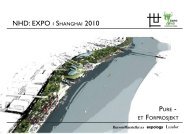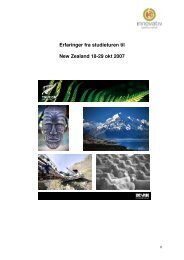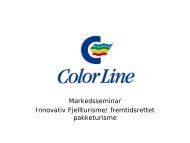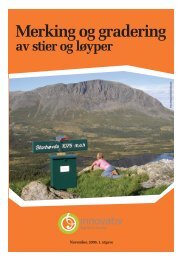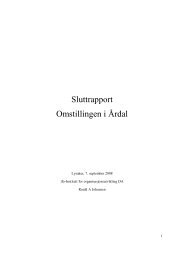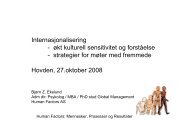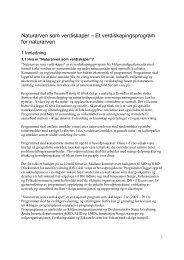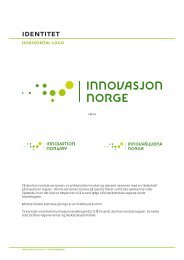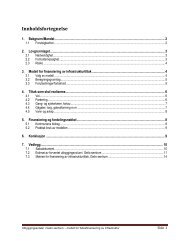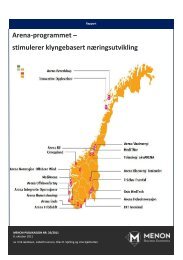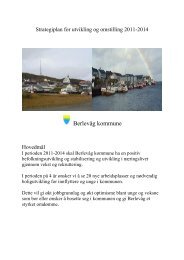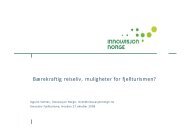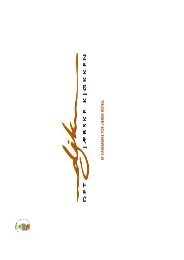Brazil, R&D and the role of clusters
Brazil, R&D and the role of clusters
Brazil, R&D and the role of clusters
You also want an ePaper? Increase the reach of your titles
YUMPU automatically turns print PDFs into web optimized ePapers that Google loves.
2. Bilateral business <strong>and</strong> relations between Norway <strong>and</strong> <strong>Brazil</strong><br />
<strong>Brazil</strong> is Norway’s most important trading partner in Latin America, <strong>and</strong> after <strong>the</strong> EU <strong>and</strong> <strong>the</strong> US, our<br />
most important destination for investments. The commercial relationship dates back to <strong>the</strong> early 19th<br />
century, when Norwegian dried cod (bacalhau) was exchanged for <strong>Brazil</strong>ian c<strong>of</strong>fee.<br />
<strong>Brazil</strong> ranks 19 on <strong>the</strong> list <strong>of</strong> Norway’s most important trading partners, notably ahead <strong>of</strong> Singapore,<br />
South Africa <strong>and</strong> India. In 2010, total trade amounted to some 2 billion USD, representing a 47 per cent<br />
increase from 2009. In terms <strong>of</strong> exports, machinery (for <strong>the</strong> <strong>of</strong>fshore industry) surpassed dried cod as<br />
<strong>the</strong> most important export group in 2010 (currently accounting for some 29 per cent <strong>of</strong> total Norwegian<br />
exports to <strong>Brazil</strong>). Fish <strong>and</strong> seafood still accounts for 24 per cent <strong>of</strong> Norwegian exports to <strong>Brazil</strong>. Given<br />
<strong>the</strong> combination <strong>of</strong> a strong <strong>Brazil</strong>ian currency <strong>and</strong> <strong>the</strong> general growth in <strong>Brazil</strong>, <strong>the</strong> future for<br />
Norwegian dried cod in <strong>Brazil</strong> looks promising for <strong>the</strong> years to come. There might also be a potential for<br />
introduction o<strong>the</strong>r types <strong>of</strong> Norwegian fish like herring <strong>and</strong> salmon. Total imports from <strong>Brazil</strong> amounted<br />
to 1.04 billion USD in 2010, with inorganic chemicals, metals <strong>and</strong> foodstuffs representing 75 per cent <strong>of</strong><br />
<strong>the</strong> total value <strong>of</strong> imported goods.<br />
The number <strong>of</strong> Norwegian companies in <strong>Brazil</strong> has increased rapidly in recent years. Currently, close to<br />
100 Norwegian companies operate in <strong>Brazil</strong> (a 100 per cent increase since 2005!). The majority <strong>of</strong> <strong>the</strong><br />
Norwegian companies established in <strong>Brazil</strong> are within <strong>the</strong> <strong>of</strong>fshore sector. Major players include Statoil,<br />
Aker Solution, FMC, Sevan Marine, BW Offshore <strong>and</strong> Seadrill. Within <strong>the</strong> maritime sector, <strong>the</strong>re are<br />
around 20 – 25 companies established in <strong>Brazil</strong>, among <strong>the</strong>m Norskan/DOF, Solstad, Farstad <strong>and</strong> Siem.<br />
According to <strong>the</strong> latest statistic, 26 per cent <strong>of</strong> <strong>the</strong> specialised ships (like anchor h<strong>and</strong>ling, heavy lift <strong>and</strong><br />
o<strong>the</strong>rs for special operations) are on Norwegian h<strong>and</strong>s. The dem<strong>and</strong> for trained <strong>and</strong> experienced<br />
seafarers <strong>and</strong> <strong>of</strong>ficers, as well as skilled labour in sectors related to oil <strong>and</strong> gas, is a challenge for all<br />
companies. The navy has monopoly as regards maritime education. The Norwegian Ship Owners’<br />
Association <strong>and</strong> “Høyskolen in Ålesund” are now joining forces in a project to look for <strong>the</strong> best solution<br />
in this field.<br />
The relation between Norway <strong>and</strong> <strong>Brazil</strong> will also be increased as a result <strong>of</strong> <strong>the</strong> Norwegian<br />
Government’s strategy for cooperation between <strong>Brazil</strong> <strong>and</strong> Norway.<br />
Maritime Transport Fleet Program<br />
The biggest ship-owner <strong>of</strong> Latin America, Transpetro, is preparing to sail with a renewed fleet. The Fleet<br />
Modernization <strong>and</strong> Expansion Program (Promef) is part <strong>of</strong> <strong>the</strong> Development Acceleration Program (PAC)<br />
<strong>of</strong> <strong>the</strong> Federal Government. 49 new oil tankers will assure greater autonomy <strong>and</strong> control in <strong>the</strong><br />
transport <strong>of</strong> Petrobras production <strong>and</strong> can serve as basis for <strong>the</strong> rebirth <strong>of</strong> <strong>the</strong> <strong>Brazil</strong>ian maritime<br />
industry.<br />
Only in <strong>the</strong> first phase, <strong>the</strong> Expansion Program will generate more than 20 thous<strong>and</strong> direct jobs.<br />
Moreover, <strong>the</strong> <strong>Brazil</strong>ian maritime industry, stagnant since <strong>the</strong> 80’s, is being reactivated. In <strong>the</strong> same<br />
way, o<strong>the</strong>r sectors <strong>of</strong> <strong>the</strong> industry were stimulated, among <strong>the</strong>m, <strong>the</strong> ship parts, iron, steel <strong>and</strong><br />
Page 10 <strong>of</strong> 40



